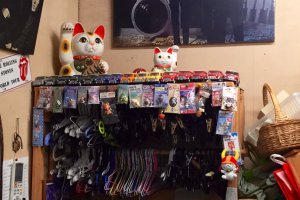Mini Recycle Shop is named after the icon of 1960s British popular culture, the Mini Cooper. It is run by Fujiwara-san, who drives a Mini himself and loves all things Mini. You will find a lot of drawings, pictures and miniature models of this small economy car, which, unfortunately, are not for sale. The rest of the stuff in the shop are though.
Mini is also the perfect name for this shop, which is relatively small. Unlike recycle shops that specialize only in pre-loved clothes (i.e Harajuku), books (i.e. Jimbocho, or the popular chain Book Off), or electronics (i.e. Akihabara), Mini has all these and more. You never know what you will find each time you visit. This afternoon, on display is something you don't see everyday: old wooden tea chests or chabako. Traditionally handmade out of Japanese cedar and used to preserve and transport tea leaves, its use dates back to the Edo period.
I love the fact that I could purchase things we need at a fraction of the retail price. I have bought an unused jump rope that my daughter needed for school for ¥50. I've replaced my shabby wallet with a gently used pure leather one from Mini for ¥100. My favorite purchase, though, is a never used cona vacuum coffee maker that normally costs ¥6,000+ but was on sale at Mini for ¥1,000. Fujiwara-san likes to keep the inventory moving. If you like something but find the price still a bit high, come back later and you might find it marked down -- that is, if nobody else has taken it yet.
Japanese have an expression mottainai, which can be translated as "What a waste!" At the Mini Recycle Shop, things that have been outgrown or are no longer needed can have another chance at being useful. For the eco-conscious, reusing things is a better option than recycling and helps reduce waste.



































One of favorite memories from a cramped shop in Penang was the sign board hanging outside which said
“We buy junk and sell Antiques,
Some fools buy and some fools sell”